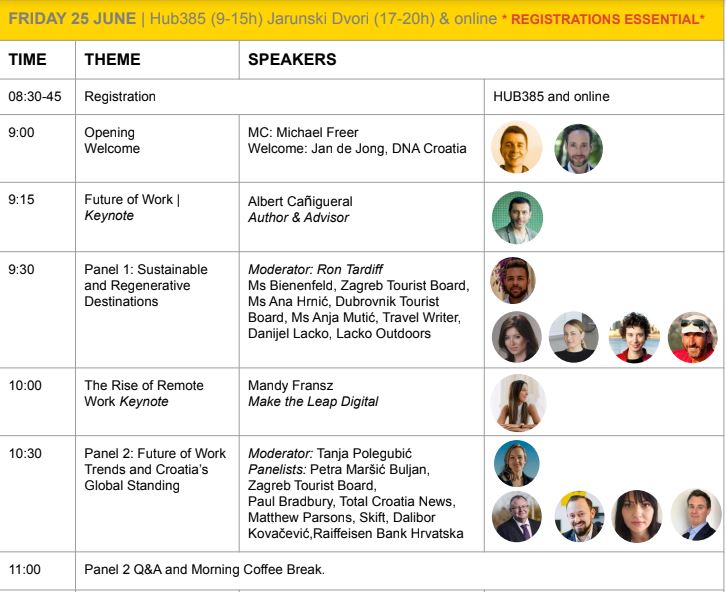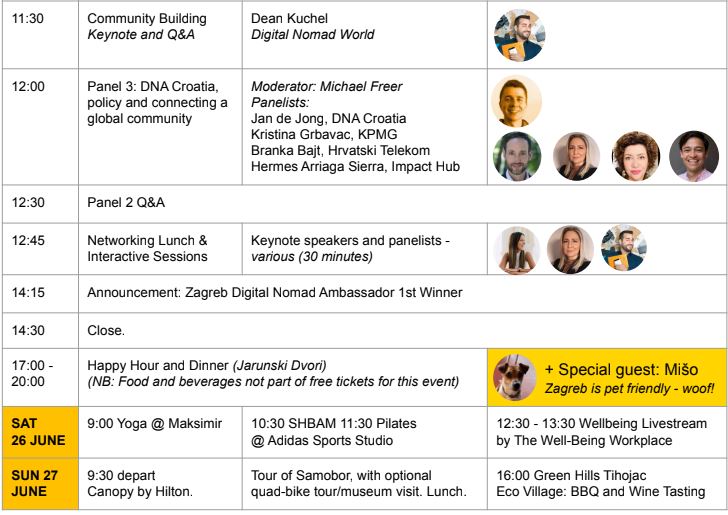Croatia Registers 14 New Coronavirus Cases, Two Deaths
ZAGREB, 28 June 2021 - Over the past 24 hours, 14 new cases of coronavirus infection have been confirmed in Croatia, there have been two related deaths, and the number of active cases stands at 425, the national COVID-19 crisis management team said on Monday.
There are 195 COVID patients in hospital, including ten who are on ventilators.
Currently, 4,138 people are in self-isolation.
To date, Croatia has registered 359,666 cases of coronavirus infection, including 8,202 deaths and 351,039 recoveries, of which 101 in the last 24 hours.
A total of 2,138,094 have been tested for coronavirus so far, 2,236 of whom over the past 24 hours.
As at 27 June, 2,529,512 doses of the vaccine have been administered, with 1,478,516 people receiving at least one dose and 1,051,096 of them receiving both doses.
For all you need to know about coronavirus specific to Croatia, make sure to bookmark our dedicated COVID-19 section and select your preferred language.
All Applications for Home Loan Subsidies Processed
ZAGREB, 28 June 2021 - The APN Real Estate Agency processed all 4,739 applications for home loan subsidies submitted in the sixth call, approving 4,464 and requesting additional information for 236, the Physical Planning, Construction and State Assets Ministry said on Monday.
Nine applications were rejected and 30 persons scrapped their applications, the ministry said, adding that a new call was planned for next year.
Applications could be submitted from 29 March to 14 May. The average amount of a subsidised loan is €76,000, the average repayment period is 22 years, and the average age of the beneficiary is 32.
Effective interest is 2.17% on average, while the nominal interest rate is 2.8% annually.
The average monthly annuity is about €380, of which the monthly subsidy is about €127.
Applications in the sixth call could be submitted by persons under 45 who don't own a flat or a house.
The amount of a subsidy depends on the index of development of the area in which a property is being bought or built and ranges from 30 to 51% of the loan.
The Ministry said home loan subsides were also a demographic measure as they were extended for two years for every child born or adopted during the loan period. Subsidies are also extended for another year for every child in the family not older than 18 when applications are submitted.
Since 2017, when home loan subsidies were introduced, 22,010 have been approved, for which HRK 430 million from the state budget has been set aside.
For more, follow TCN's dedicated news page.
Croatia Near Top in Terms of Digital Services, Jutarnji List Writes
ZAGREB, 28 June 2021 - Croatia is near the very top among European countries in terms of development of the digital services it offers to citizens, and a total of 89 e-services are available to citizens, Jutarnji List daily reported on Monday.
According to data from the Central State Office for the Development of the Digital Society, there are 1,281,911 users of the e-Citizens system in Croatia. During the pandemic, the number of users rose by as much as 50%. On 1 March 2020, there were 839,935 users, and by 26 May, the number had gone up by 441,976.
Interior Minister Davor Božinović told Jutarnji List that 2020, the year of COVID, had forced people or at least hurried them into looking for solutions in the digital world.
"Every time when we move the solution to a problem or the exercise of a right into the digital sphere..., we send a clear message to citizens: We appreciate your time, we are thinking of your health," Božinović said.
It all started back in 2014 with the issuing of new electronic ID cards and launching the e-Citizens system as a central place for e-services.
Of all the applications available, citizens use the application of the Ministry of the Interior (MUP) the most. To date, as many as 773,165 applications have been submitted, including 8,401 applications for an e-driver's licence, 3,965 for an e-passport, 4,149 for e-registration of temporary residence of Croatian citizens and 122,568 e-registrations of permanent residence of newborn children.
MUP's IT experts also launched the Enter Croatia project. It is used by foreigners who intend to stay in Croatia, and they can submit their data in advance via the website in order to reduce waiting times at the border. The program has now been upgraded with digital COVID certificate. Over the past year, 2,469,931 announcements of arrival in Croatia have been received through the application. The application also includes a portal via which digital nomads can apply for a temporary stay of up to 12 months. Thirty-six digital nomads have applied to date.
The Commercial Services Agency (AKD) has announced new digital projects, such as the new generation of ID cards and passports, biometric residence permits, and EU digital COVID-19 certificates.
"We will also establish a platform with electronic services for e/m-Signature and e/m-Stamp, create an ID mobile application and enable valid electronic signatures via mobile phones and tablets," said AKD CEO Jure Sertić.
As of 2 August, the e-ID card will be merged with the health insurance card but not with the driver's licence. Minister Božinović points out that an EU directive prescribes the appearance and content of the form of driver's licences and that an ID card cannot contain a driver's licence.
In September, the e-Citizens system will be upgraded to include the 2021 census of the population, households and dwellings. Citizens will be able to register using an electronic census questionnaire, Jutarnji List said.
For more news from Croatia, follow TCN's dedicated news page.
Zagreb Digital Nomad Week 2021: 5 Key Takeaways
June 28, 2021 - After an action-packed and thought-provoking Zagreb Digital Nomad Week 2021, some key takeaways for Zagreb and Croatia.
I wasn't quite sure what to expect from Zagreb Digital Nomad Week 2021, but I knew that it would be inspiring. Sometimes, when I write about an opportunity for Croatia from within Croatia, it is hard to have a global perspective. Local viewpoints are not necessarily transferred to the global viewpoint. And while a lot has been written by TCN about the digital nomad opportunity for more than 2 years now, what were the true feelings of significant names in the global nomad community?
I got my chance to find out last week with a range of keynote speeches, panel discussions, and lots of informal chats with various international nomads from all over the world who were in Zagreb. All of the feedback was extremely positive, and much of it very inspiring. Here are 6 of my takeaways from Zagreb Digital Nomad Week 2021.
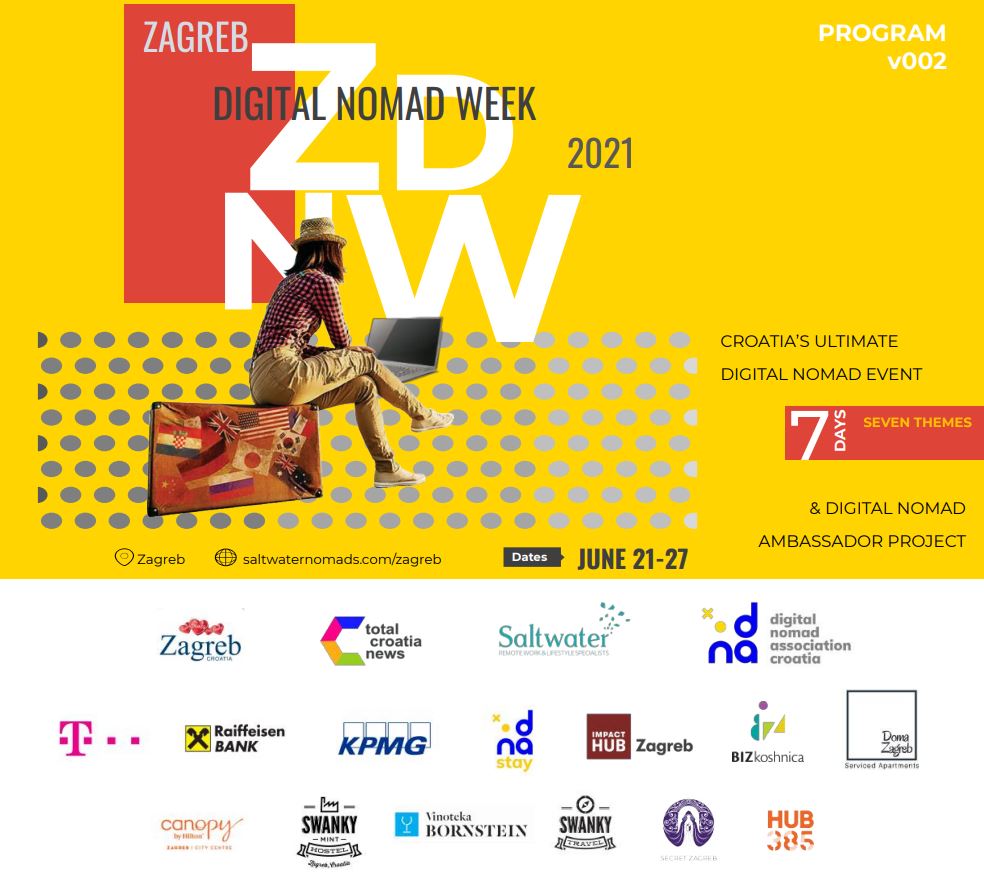
1. The impact of the digital nomad permit is far greater than the number of applications
The Croatian Prime Minister's decision to act on the LinkedIn open letter from Dutch entrepreneur Jan de Jong last year, meant that Croatia announced that it would be only the second country in Europe to offer such a visa. The ensuing 12-month permit came into effect on January 1 this year, and the whole story had global headlines - CNN, Washington Post, Euronews and many more. The timing coincided with several other factors. The most important of these was that Croatia remained open to non-EU/EEA citizens during last year's pandemic, and it was also in the EU but not in the Schengen zone (thereby making it an attractive option for those on Schengen visas to wait out 90 days).
A combination of these factors I believe helped raise the profile of Croatia considerably. Many discovered Croatia for the first time, and more and more remote workers headed in Croatia's direction. Although the number of applications for the permit is relatively low at the moment (147 in total), the number of digital nomads is growing. I must have met over 50 digital nomads in the last week, only 2 of whom had the permit. The point was made that nomads are by definition nomadic and not necessarily looking to live in one country for 12 months. But the number of people coming for a month, two, three is on the rise.
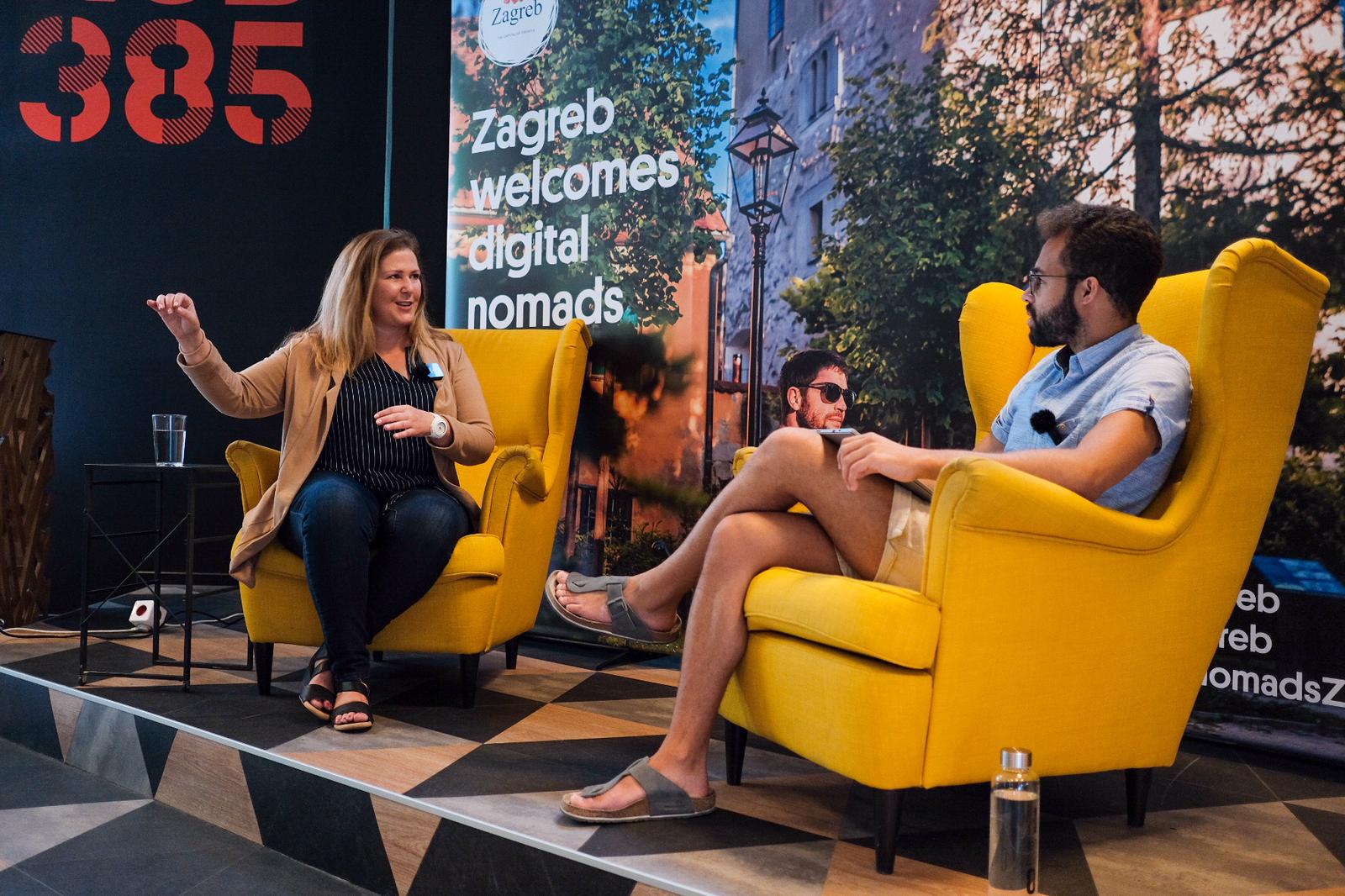
2. Croatia is a leader in public-private partnership for advancing digital nomad tourism opportunities
This was a surprising finding for me, as Croatia is not known for its public-private partnership initiatives. Talking to Dean Kuchel of Digital Nomad World was especially instructive. He had never come across a country with such engangement between the public and private sector, a partnership he described as groundbreaking.
The headline cooperation, of course, was between de Jong, the Prime Minister, 5 government ministries and numerous other parties to deliver the DN permit. But the engagement was far deeper than that. Dean was impressed at the involvement at Zagreb Digital Nomad Week 2021 of the banking section (Raiffeisen Bank Hrvatska), financial consulting (KPMG Croatia), and communications (Hrvatski Telekom), as well as SKIFT. Co-working spaces such as Impact Hub, HUB385 and BIZkosnica. Winebars such as Bornstein, Hotels such as Canopy by Hilton, Hostels such as Swanky Mint Hostel and private accommodation of Doma Zagreb. The formation of the Digital Nomad Association Croatia is an important bridge between the authorities and digital nomad community.
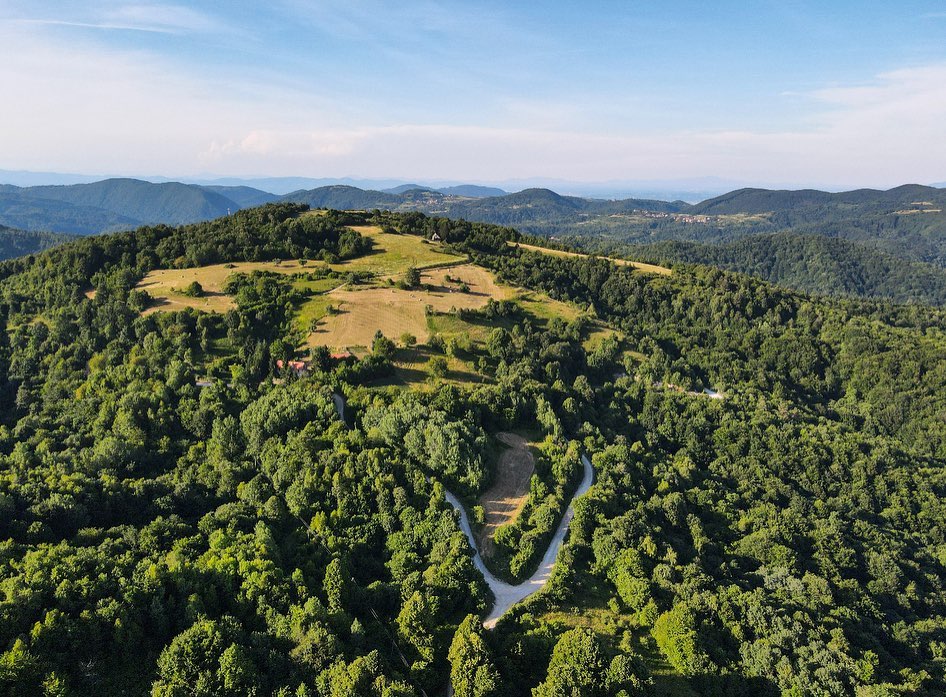
ZDNW was a great public-private partnership between Saltwater Nomads, Total Croatia News, and Zagreb Tourist Board (funded by the latter), with Zagreb County Tourist Board hosting the final day in Samobor and Zumberak Nature Park. ZDNW followed on from two other successful public-private partnerships in Dubrovnik, with the Dubrovnik for Digital Nomads conference last October, and the recent Dubrovnik Digital Nomads-in-Residence program, both of which were a partnership between Saltwater Nomads, TCN, and the city and tourist board of Dubrovnik.
3. The seeds of collaboration not competition are already sown and bearing fruit among destinations.
Having written about tourism in Croatia for 10 years, one of the most positive aspects of this whole initiative has been the collaboration between different tourist boards and other official bodies. Croatia has a very fragmented tourist board structure, and there has been a tendency to treat another tourist board as competition.
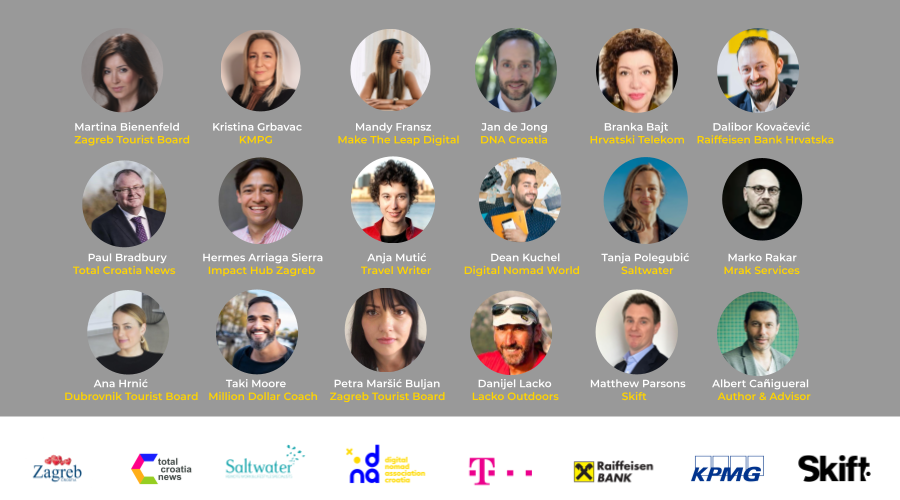
Zagreb Tourist Board made a great contribution on a final day panel at the Dubrovnik Digital Nomads-in-Residence progamme, and Dubrovnik Tourist Board director Ana Hrnic was a great panellist on ZDNW. The partnership of Zagreb city and county tourist boards is a great example of how to improve the quality of a destination by working together. At ZDNW, there were representatives from Zadar, Split, Osijek and Istria, all interested in taking this story forward... together. Zagreb as a digital nomad destination will be all the stronger if there are other communities in other destinations in Croatia. The concept of a Croatian digital nomad trail was discussed in Dubrovnik. By working together to develop that, the various stakeholders can produce an incredible end product.
What was especially encouraging to me was the number of local people who ended the week a lot more enlightened about the digital nomad movement. The concept of WiFi and a bed being all that is required was relatively widely held a year ago. That is changing quickly.
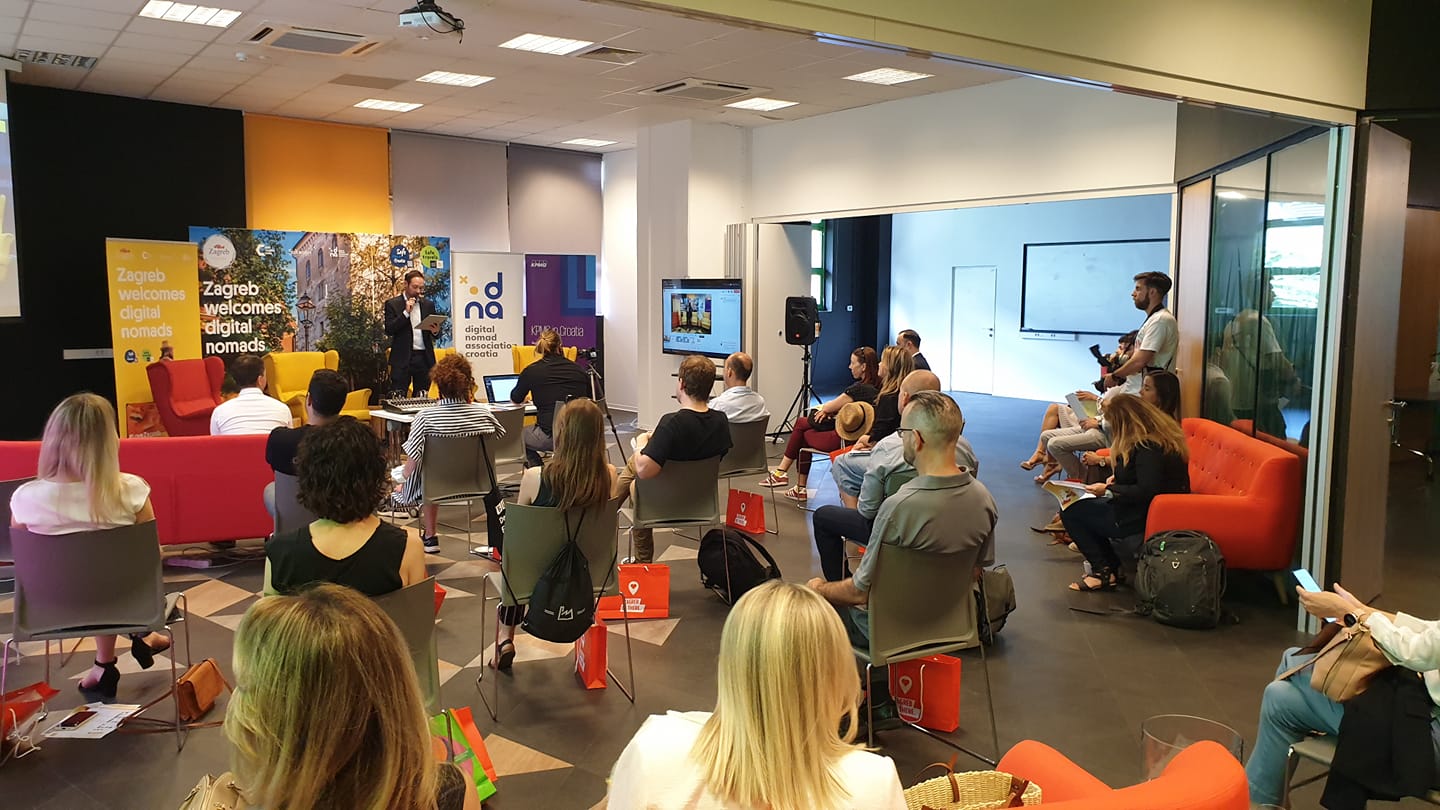
4. The development of community is key to success.
In an interview prior to ZDNW, keynote speaker and future of work explorer Albert Cañigueral talked about the importance of having a digital nomad community in place:
The sentence “content is king, context is queen” is widely used in marketing. In the DN universe I would translate as people (community) is king and location is queen. Our experience was just mind-blowing because of the community of DNs that were selected to participate, the partners of some DNs who decided to be part of the adventure, the local people who joined the workshops and other moments, the professional team that ran the whole programme and also the support from the city hall (in the middle of local elections!).
Dean Kuchel's simple mantra perhaps explained it best. I travel solo, but I never travel alone.
The strength of the community is probably the key deciding factor for many in where to travel to next.
5. The positive mindsets of the digital nomad community will have a majorly positive effect on the mindsets of the next Croatian generation.
One could not help but be positive last week. So much great energy, so many inspiring people. People who care about community and the world around them. People will new ideas, a fresh look on life. As those communities grow and more digital nomads come to explore Croatia, the safe, authentic lifestyle destination, that energy will trickle into the mindset of the local population. After decades of emigration and no opportunity, an influx of new ideas and people coming into the country rather than running away will be a long-term positive.
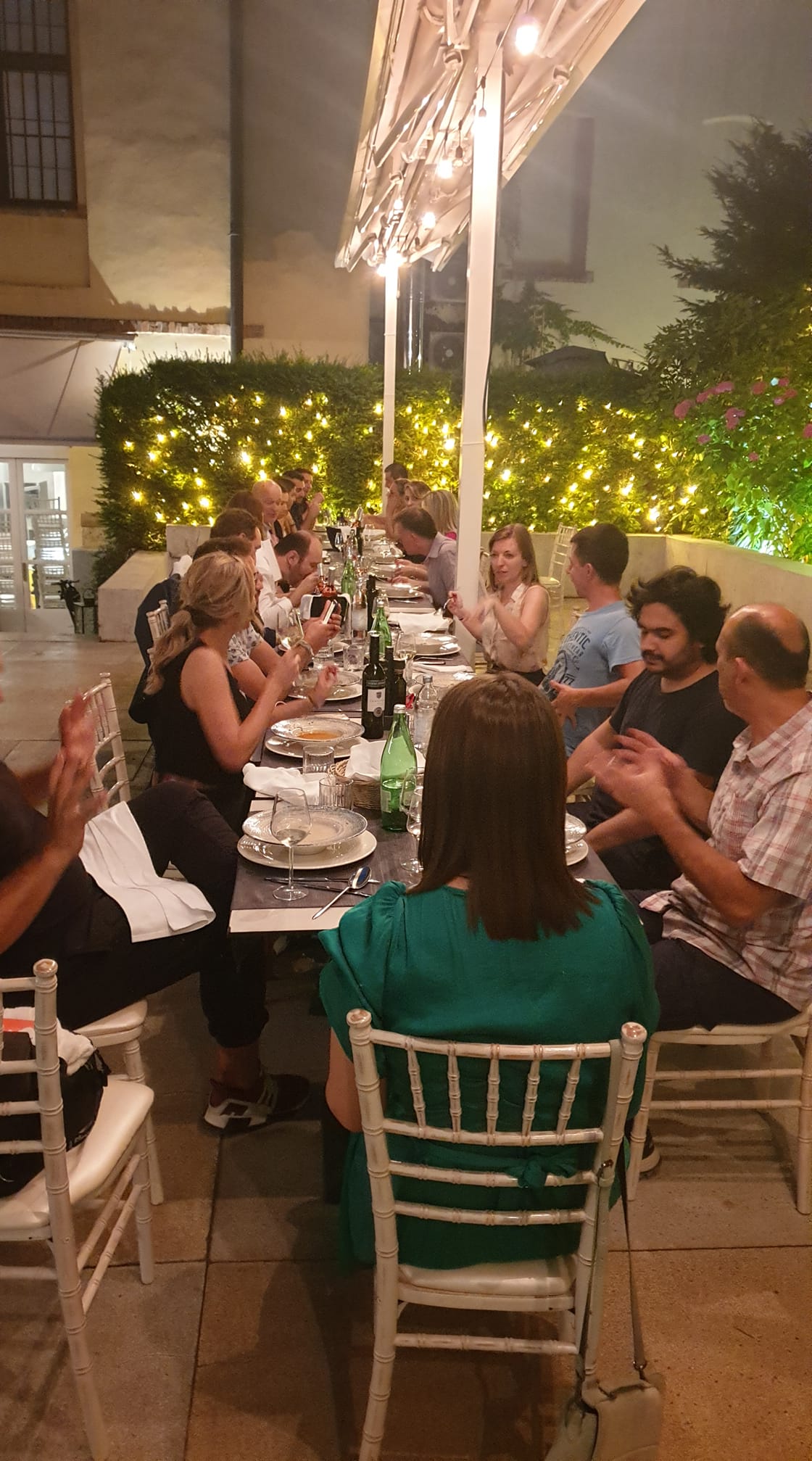
6. Zagreb is a truly exciting destination for digital nomads, with most of the essentials already in place.
I was really curious what our visiting digital nomads would think of Zagreb. I think it has become a very cool city and think it has plenty to offer, but how does it compare internationally, and what is it missing? Dean Kuchel of Digital Nomad World gave his verdict:
"Zagreb is missing more digital nomads. It has perfect weather, great nightlife. Everybody speaks English, everybody is kind to you, and it is easy to get around. The Internet is fantastic, thank you. It has been very helpful with work. I don't think it misses anything really. It checks all the boxes. It has good city life, nature, access to the sea. Just stay the same please."
A great week, an important milestone for Croatia moving forward, and lots of exciting possibilities moving forward.
The keynote speakers at Zagreb Digital Nomad Week 2021:
Day 1 - Cybersecurity - Marko Rakar of MRAK Services
Day 2 - Online Presence - Mandy Fransz of Make the Leap Digital, and Taki Moore of Million Dollar Coach
Day 3 - Remote Careers - Kristie Sullivan and Ron Tardiff, followed by panel of Dubrovnik Digital Nomads-in-Residence hosted by Michael Freer
Day 4 - Tax and Finance - Kathleen McPaul, followed by Kristina Grbavac from KPMG Croatia
You can see all these presentations in the Day 1-4 recap.
Day 5 - Future of Work
You can see all the presentations for Day 5 above, with a guide to the speakers below.
For more information about the Zagreb Digital Nomad Week, check out Saltwater Nomads.
For the latest news and features on digital nomads in Croatia, follow the dedicated TCN section.
Yellow Warnings and Recommendations - New Croatian Heatwave Starts Today
28 June, 2021 – After a brief period of somewhat pleasant temperatures, today marks the beginning of yet another new Croatian heatwave.
The weather was rather cool throughout spring, however, it seems summer is back, and with a vengeance. After one stifling heatwave ran its course last week, leaving many feeling the effects of exposure to sun, a new Croatian heatwave is now upon us.
Croatian meteorologists are now warning of a new Croatian heatwave beginning today. According to HRT, it will supposedly reach its highest temperature during the middle of this week. Heat waves aren't particularly unusual in Croatia, but this year they seem to be starting earlier than normal. In addition, the fact they were preceded by cooler than usual May weather makes their impact seem even more dramatic.
Yellow Warning
A weather alarm is in place across Croatia for this week with what is known as Yellow Warning in effect for some regions. More precisely, for Kvarner area, Central Croatia and the Dubrovnik area. Temperatures will rise in the upper thirties with daily highs in certain areas potentially reaching 38°C. Recommendations are to keep out of the sun and consume plenty of water. Of course, sunscreen is always a good idea should you really need to be out in it.
Interestingly, there is also a warning from HAK as well. They are instructing drivers to start longer drives early in the morning or through the night. It would be smart to avoid driving during the hottest parts of the day as a new Croatian heatwave bites. It is also important to remember to stay very well hydrated and use air-conditioning when in the car. Unfortunately, this year we saw a tragic event involving a child being left in a car as the sun beat down on the vehicle, ending with deadly consequences. As such warnings against leaving children or animals in cars for even a few minutes are also useful to remind ourselves of regularly.
Regardless of whether you're going to the beach to enjoy your holiday or you're working outdoors, make sure to keep track of the weather warnings this week as a new Croatian heatwave holds us in its grip. Be especially cautious when organising trips within Croatia, and of course – make sure to stay hydrated at all times.
For more on travel in Croatia, follow TCN's dedicated page.
Is Climate Change Bringing Strange Fish to Northern Adriatic Sea?
June the 28th, 2021 - Climate change is a threat to us all and the vast majority of people are now more than aware of that, minding their carbon footprint and trying to recycle and reuse as much as they possibly can. The Northern Adriatic sea, however, keeps turning up some unexpected finned visitors.
As Morski writes, there are many different types of fish in the Croatian Adriatic sea that are very, very rarely caught, or are not present all over the Adriatic, and so they confuse fishermen with their colours, weight or appearance. Such was the case with the catch of Andrej Andrija Vajdic, whose catch, when placed on social media, resulted in many attempts at determining just what this fish was. Most of those guesses were unfortunately completely wrong.
''After just a few minutes, I got a bite on the line and the fish started pulling down very hard. After a short fight with it, I took it out, and saw a fish I wasn't sure about. I learned that the locals call it an arrow, and it does have that sort of face...''
Here is what Andrej said about his unusual catch in the Northern Adriatic sea:
''As I live in inland Croatia, I'm not often given the opportunity to go sea fishing. I mostly fish only when on holiday, which was the case this year as well. A colleague from work was on holiday in southern Dalmatia at the same time, which was a great opportunity for a little competition - who would catch better fish.
As I was on holiday in Praputnjak, I went fishing in Bakar every day. During the first few days the catch was reduced to standard fish, but on the last day it shifted a bit. At the end of that day, I decided to just go for a short evening and try fishing until the next opportunity came,'' says Andrej.
''I re-set the rod and on the same principle caught three more of the same weird sort of fish. I also learned that the ''arrow'' is usually harder to catch because of its fast movement, which is why this holiday will remain in my special memory. Of course, my colleague undoubtedly lost in our small competition,'' Andrej said.
The fish that Andrej caught is a blue arrow (Trachinotus ovatus, Linnaeus, 1758), a fish from the same family, Carangidae, to which somr of the most famous faces among sea fish belong. It is most numerous in the Southern Adriatic, but due to global warming it is more numerous in the Northern Adriatic sea. Otherwise the blue arrow may grow to a maximum of 70 inches in length.
The first time this species of fish was found was at Zlatni rat on the island of Brac, far from Northern Adriatic sea waters.
For more, follow our lifestyle section.
Dubrovnik Mayor Mato Frankovic Praised by CLIA's Kelly Craighead
June the 28th, 2021 - Dubrovnik Mayor Mato Frankovic has been praised by the Cruise Line International Association's director Kelly Craighead as Croatia's southernmost city sees cruise tourism make a gradual but steady return to its waters.
As Morski writes, Kelly Craighead sent a letter to Dubrovnik Mayor Mato Frankovic in which, among other things, she thanked him for his engagement because the City of Dubrovnik, despite the ongoing coronavirus crisis, stood firmly by this organisation.
''The coronavirus pandemic has brought some new challenges to everyone, but I'm glad that we've continued our cooperation during this time, which is why I'm sure that we will soon be able to intensify our joint efforts in responsible and sustainable tourism management in this destination,'' said Craighead, noting that sustainability remains very much a priority on the CLIA's list.
''We're really pleased that we managed to restart our operations around the world, including in Dubrovnik,'' she writes, thanking Dubrovnik Mayor Mato Frankovic and his team for their engagement and role they played in restarting the business of cruise companies operating in Croatia, which is the result of lifting the ban on passenger ships operating as international cruises in Croatian ports. The above was Dubrovnik Mayor Mato Frankovic's own initiative.
In her letter, the leader of the umbrella and largest association of the cruise industry, which represents 95% of the total market, states, among other things, that the city administration headed by Mayor Frankovic and Deputy Jelko Tepsic is a longtime partner of CLIA.
''We're proud of the Cooperation Agreement we signed back in July 2019 and everything we have achieved together so far, and the partnership and cooperation between CLIA and the City of Dubrovnik is a model for us successful destination management and engagement with local communities, we aren't going to miss the opportunity make it public,'' wrote Kelly Craighead.
In conclusion, Craighead is pleased that the cruise industry will in part contribute to the economic recovery of Dubrovnik and she thanked Dubrovnik Mayor Mato Frankovic for being a strong advocate of the interests of his city, sustainable tourism and for remaining a friend of the CLIA and the cruise industry as a whole.
For more, follow our lifestyle section.
No Invitation Needed for New Zagreb Vaccination Programme - Details
June the 28th, 2021 - The brand new Zagreb vaccination programme will finally require no sign up, registration or invitation which might risk getting lost somewhere in the process along the way - as has been the case for so many. Want the vaccine? Just turn up.
As Poslovni Dnevnik writes, at the Andrija Stampar School of Public Health in Zagreb, from Monday, June the 28th to Wednesday, June the 30th, 2021, people will be able to come and be vaccinated against COVID-19 without giving any special notice, the Croatian Institute of Public Health announced.
Citizens of Zagreb, but also people from other parts of Croatia, will be able to be vaccinated against COVID-19 next week without a special invitation or announcement as the new Zagreb vaccination programme gets going.
In addition to the three locations in Zagreb where vaccination will be carried out by the aforementioned Institute, people will be able to receive their first dose of the vaccine from Monday at Rockefellerova ulica 4, organised by the Croatian Institute of Public Health and the Faculty of Medicine, University of Zagreb, from 09:00 to 15:00.
People aged 65 and over and people with chronic diseases will be vaccinated first from 09:00 to 11:00, and then from 11:00 to 13:00 people aged 40 and over can come, from 13:00 to 15:00, those under 40 years of age can come and be vaccinated. The same schedule applies to Tuesday, June the 29th, 2021, while the same Zagreb vaccination programme is scheduled for Wednesday before and after noon.
Turning up to be vaccinated doesn't require any announcements, but the number of people who can be vaccinated in one term is limited to 800 to a maximum of one thousand. The vaccination organiser will distribute vaccination coupons to people that day according to their time of arrival, depending on the level of interest.
''We want to open to citizens as many opportunities up as possible for people to come and get vaccinated against COVID-19 in order to protect ourselves from the infection with the highest possible vaccination rate, but also to prevent its further spread,'' stated doc.dr.sc. Krunoslav Capak, the director of the Croatian Institute of Public Health.
It is necessary to have an identity card and a health insurance card with you upon arrival, because only persons who have HZZO insurance are currently being vaccinated in this way. People are also being asked to wear a mask and to dress lightly, bring water and suitable sun protection with them. People should adjust their arrival to the stated schedule in order to wait less and be vaccinated as soon as possible.
''I believe that we will be able to vaccinate all those citizens who want the vaccine in the planned time, so we'd like to ask them for cooperation and patience,'' Capal said.
Vaccination with the first dose will be done solely with Pfizer.
For all you need to know about coronavirus specific to Croatia, make sure to bookmark our dedicated COVID-19 section and select your preferred language.
New Serbian Daily (Nova), Faced With Political Obstruction, to Be Printed in Croatia
ZAGREB, 27 June, 2021 - Serbia will get a new daily newspaper on Wednesday, 30 June, but for reasons of political obstruction it will not be printed domestically but in Croatia.
The daily, called Nova, will be written and edited by journalists from the Serbian news website nova.rs, which is owned by the Luxembourg-based United Media Digital company, a member of the United Group. Since March 2019, the United Group has been majority-owned by BC Partners, one of the leading global investment companies.
The United Group also owns the regional cable television channels N1 and Nova, and has recently acquired the Belgrade-based liberal daily.
The Serbian Progressive Party of President Aleksandar Vučić and the ruling coalition see the United Group as a media corporation supporting the Serbian opposition and working against the state and national interests. The ruling coalition has dominant influence over the majority of print and electronic media, notably tabloids, as well certain news websites. The electronic media regulator is also under their influence and several non-parliamentary opposition parties are constantly under attack from pro-Vučić media.
In such circumstances, the editors and owners of Nova tried to find a publisher in Serbia, but failed. All publishing companies approached by Nova showed a complete lack of interest even though they were offered more than the market price for their services, the newspaper said in a statement.
Stojan Drčelić, the editor in chief, and Veselin Simonović, the director of the Nova website and newspaper, said that the fear of reaction from the regime outweighed the commercial interests of publishers.
The Nova newspaper will be printed in the eastern Croatian city of Osijek and distributed across Serbia.
For more about Croatia, CLICK HERE.
Croatia’s Fisheries Exports Up 31%
ZAGREB, 27 June, 2021 - In the first quarter of 2021, Croatia's fisheries exports went up 31% on the year to almost €94 million, with 17,700 tonnes of commodities exported, the Agriculture Ministry says.
Bluefin tuna exports were record-high both in quantity and value terms.
The value of first-sale went up by 3% and the average price of sea fisheries commodities by 20%.
The quantity and value of aquaculture production continues to increase, surpassing €33 million in 2020, a 12% increase in value and a 3% increase in quantity.
Surveys show that the growth and consumption of fisheries and aquaculture products in 2019 had gone up by 11% on the year to a little over 20 kilos per capita.
For more on business in Croatia, follow TCN's dedicated page.
For more about Croatia, CLICK HERE.


